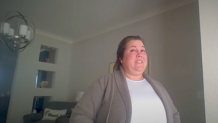Body camera video shows the moment Elizabeth Hernandez called Miami-Dade Police to her home in 2019 reporting she was the victim of a crime.
“There are currently 146 companies using my NPI (national provider identifier) number without my authorization,” she told the responding officer.
But federal investigators say Hernandez was the one breaking the law.
“She contacted the Miami-Dade Police Department and made a fake police report…just to cover her tracks,” said Stephen Mahmood, Assistant Special Agent in Charge of the Miami regional office for the U.S. Department of Health and Human Services Office of the Inspector General.
Hernandez, a mother of five, claimed someone else was billing in her name. But investigators said they discovered she was involved in a genetic testing scheme that cost taxpayers millions and she was doing it from her own home, in Southwest Miami-Dade.
“We identified several providers who were ordering a lot of genetic testing, and Elizabeth Hernandez, of all of those was the number one,” Mahmood said, adding she would also “bill Medicare for a telehealth visit for a person that she never saw, a person she never spoke to on the telephone.”

Mahmood’s office is tasked with criminal investigations of fraud and abuse involving programs like Medicare.
“Based on the data she ordered approximately 200,000 genetic tests for about 70,000 Medicare beneficiaries that resulted in about $200 million dollars worth of fraudulent claims,” he explained.
Here’s how investigators say the scheme works: Telemarketing companies contact Medicare recipients – using illegally obtained personal data. They then get doctors or other providers to sign off on unnecessary genetic testing, supposedly for cancer or heart conditions, in exchange for a kickback. In many of these cases, investigators say the providers never even spoke to the patients.
“A telemarketing company will call the beneficiary and say, ‘Hey we’re with Medicare and you qualify, or you need this genetic test,’” Mahmood explained, adding Medicare representatives would not call someone to offer or market a service or request personal information.
Then, he says they would mail a kit to the Medicare recipient. “A kit would be mailed to them. They would swab themselves, repackage it back up and then mail it back to a call center. Medicine doesn’t work that way.”
Investigators say many of the people targeted by call centers were elderly and vulnerable. Some didn’t even remember agreeing to the test. And when results were sent back to them, Mahmood says, “they’re gobbledygook, they garbage.”
He says the lab bills Medicare thousands for the tests, and everyone gets a cut.
“They pay the telemarketer, the telemarketer then pays kickbacks or bribes to the doctor that signed the order,” Mahmood said.
The nurse Elizabeth Hernandez was among several people charged in connection to genetic testing fraud. In December, she was sentenced to 20 years behind bars.

NBC6 Investigators corresponded with Hernandez from prison.
She sent a lengthy email, writing in part, “I ordered tests only for those patients that met the medical necessity requirements…" and it was the lab that was committing the fraud. She added prosecutors “twisted the evidence, lied, and cherry-picked sentences in text messages and emails to fit into their fabricated story...”
But a jury found this was a true story and investigators say the evidence backs it up.
Evidence including Hernandez’ monthly deposits highlighted in one chart provided by investigators. It shows her income skyrocketed in 2020—at one point reaching more than $280,000 for just one month of remote telehealth work. In all, prosecutors said Hernandez pocketed approximately $1.6 million in the scheme.
Investigators shared text messages they say show a conversation between Hernandez and a friend, celebrating how many orders they signed one month.
One reads, “we have to be over 500 pts (patients) by now…”
Then, she sent a meme with the words, “We getting’ money.”

One analysis provided by investigators showed in most cases, it took Hernandez fewer than 15 seconds to sign an order once she got it.
“She had so much that she had her family sign them,” according to Mahmood. “She had her friends sign them because there weren’t enough hours in the day for her to sign them.”
Investigators also shared an email in which a friend questioned Hernandez about ordering a genetic test for ovarian cancer for a man.
Hernandez responded, “Change it to prostate.”
When asked about that email, Hernandez told NBC6 Investigators she was merely correcting an error.
“This type of fraud puts pressure on the Medicare program,” Mahmood said. “It creates billions of dollars going out the door just to line the pocket of criminals, thieves. That’s your money that you’re putting into the system that person is using.”
Hernandez was convicted on several counts, including healthcare fraud and making false statements. She has since hired a new attorney and is appealing her case. Her attorney declined to comment on her appeal.
If you suspect a provider is engaging in telefraud, investigators with the Office of the Inspector General for HHS want you to call 1-800-447-8477 or visit TIPS.HHS.GOV

